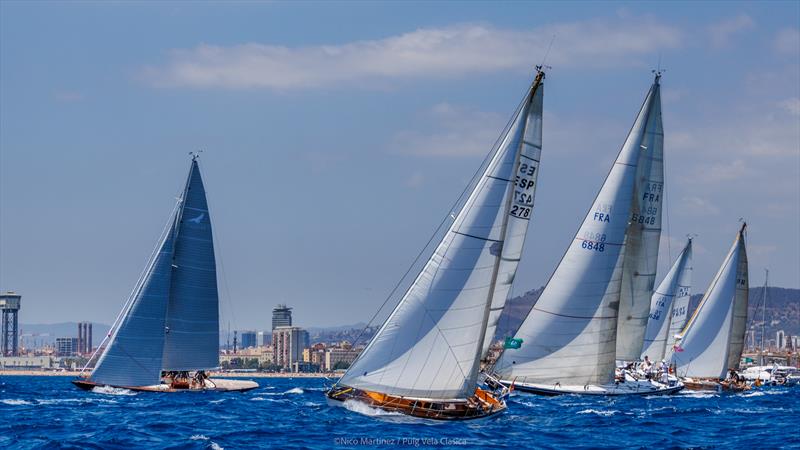
Puig Vela Clàssica Barcelona start postponed until tomorrow
by Covadonga Muñoz 4 Sep 2024 10:04 PDT
4-7 September 2024

Tomorrow's favourable weather conditions predict a day of nautical competition and splendor for the classics © Nico Martínez
The complicated weather situation currently affecting the Catalan coast has prevented the inauguration of the Puig Vela Clàssica regatta, whose sports program included the first three races of the 12 Metre class.
A storm front has crossed Barcelona and its waters, bringing downpours with the threat of abundant electrical activity, conditions that have led the race committee to delay the start of the day. Unfortunately, when the front had passed by noon, the wind was absent, leading the organizers to suspend the day's races.
However, this delay has only increased expectations around the iconic 12 Metre class of the America's Cup, whose return to Catalan waters is eagerly awaited by sailing enthusiasts and professionals. Tomorrow, if weather conditions permit, the regatta will begin with the 77 classics hoisting their sails.
The Real Club Náutico de Barcelona expects all participating categories — Big Boats, Bermudian and Gaff Rigged Yachts, Classics, Classic IOR, and Modern Classic — to compete with southern winds of light to medium intensity, maintaining the start time at 13:00 on the two race courses.
The Evolution of the 12 Metre Class and its Legacy in the America's Cup
The International 12 Metre Class began its journey at the beginning of the last century, being one of the boats that competed in the Olympic Games in the consecutive editions of 1908, 1912, and 1920, after the forced break due to the First World War. The America's Cup experienced its first golden age with the selection of the 12 Metres.
With the outbreak of the Second World War, the competition was suspended until 1958. At that time, the expensive J-Class gave way to the more affordable and numerous 12 Metres. To do this, it was necessary to modify the Deed of Gift, limiting the waterline length from 65 to 44 feet, which allowed the International 12 Metre Class to be chosen to compete in the America's Cup.
Thus, in the 1958 edition began the most glorious era of the America's Cup, which lasted until 1987, when the challenge of New Zealander Michael Fay clung to the rules of the Deed of Gift to challenge Dennis Conner with a gigantic monohull, while the latter successfully defended himself aboard a simple 40-foot catamaran.
The ten editions held between 1958 and 1987 marked the best era of the America's Cup, thanks to the great acceptance of the 12 Metres, which led to numerous international participation and the reorganization of the challengers' qualifying series. Legendary boats like Columbia, Weatherly, Constellation, Intrepid, and Courageous (both twice), Australia II, and Stars & Stripes inscribed their names in gold letters in the winners' list.
As a technological spearhead, which the America's Cup has always been, some teams found strategic alliances with companies from the then-leading aerospace industry. The emerging use of aluminium in the construction of boats and masts was the field where the most notable advances were made thanks to the 12 Metres.
But it was in 1983 when the 12 Metres starred in the first great milestone of the America's Cup. Australia II dared to defeat the American Defender for the first time, winning a dramatic 4-3 against Dennis Conner's Liberty, known as Mr. America's Cup. A myth of the competition who could save honour by recovering the Hundred Guineas Cup four years later in Australian waters with his Stars & Stripes. The edition held in Fremantle would end up being the last edition contested by the best boat the America's Cup has ever had, when later New Zealander Michael Fay launched a challenge to Conner subject to the Deed of Gift between a gigantic monohull and a tiny catamaran.
In this XVII edition of the Puig Vela Clàssica Regatta, the 12 Metre fleet competes grouped into two categories, due to the passage of time between the first boats and the more recent ones. Division B are more vintage, built in wood and with less avant-garde sails. Among its 8 participants, the presence of the long-lived Thea (1918) stands out. The five designs of the following generations compete in Division A, highlighting the presence of Kiwi Magic (the first boat built in fibreglass to compete in the 1987 America's Cup) or Kookaburra II, also owned by Luna Rossa team owner Patrizio Bertelli.
The XVII Puig Vela Clàssica Barcelona Regatta is an international event that is part of the official calendar of the RFEV and is scoring for the II International CIM Championship (International Mediterranean Committee), as well as for the XIII Mare Nostrum Trophy - Spanish Cup of Classic Boats.
www.puigvelaclassica.com